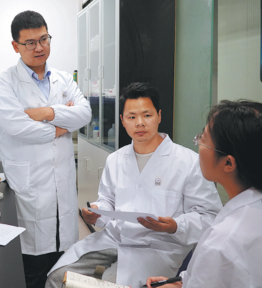How science is embracing online world to thrive
Located inside Hefei high-tech zone, Grand Union of Innovation has helped launch over 2,200 science and tech companies

It all started online. A glowing sunflower, which produces light through bioluminescent genes to make it a self-luminous plant, went viral online through a short video, attracting millions of views.
Netizens marveled. Comments poured in. More importantly, investors were attracted. "Before the online buzz, we were chasing investors. After going viral, they started finding us," said Li Renhan, founder of Magicpen Bio, a Hefei, Anhui province-based startup and developer of the self-luminous plant.
In much of the world, the internet is an escape from real life. But in Hefei, the story is about the compounding power of attention — how every click, every comment, every "like" adds velocity to scientific development.
Across this inland city of 10 million, a new development model is taking root — one where frontier science, civic engagement and viral media are fused into a larger force the city calls "network civilization".
Here, lab-born innovations are introduced to the public through livestreams and comment sections, where everyday users influence the trajectory of R&D, and where the machinery of high technology is backed not only by government funding, but also by online attention.
The implications are significant for China's economy at a time when traditional engines like real estate and infrastructure are experiencing slowing momentum. Hefei's experiment suggests that the next phase of growth might not come from new roads or factories, but from what happens when people and pixels start building things together.
According to Li, among the online comments was some notable help from people suffering from electromagnetic hypersensitivity — a condition that can have a wide range of symptoms that are believed to be caused by exposure to electromagnetic fields, such as those often found in conventional light sources. They saw in the soft glow of Magicpen's creation something deeply personal: a way back to comfort, to normalcy.
"A lot of people think our story started with that glowing plant. But really, our business started with an online message," he recalled.
Li, a then 28-year-old doctoral student at China Agricultural University, wanted to launch a biotech startup in March 2023. He sent just a few paragraphs into the online box of the Grand Union of Innovation, a high-tech incubator like Silicon Valley in the United States.
Two days later, his phone rang. With the help of GUI, Li set up his company in Hefei, relocated, and secured venture capital funding from Plum Ventures, a partner fund of GUI.
Today, Magicpen Bio has more than 1,000 square meters of lab space and over a dozen researchers.
Much of that transformation is centered in GUI. Tucked inside Hefei high-tech zone, GUI occupies just 1 percent of the city's developed area, but has helped launch over 2,200 science and tech companies since 2022.
It's not a typical business park. Inside, there are startup prototype medical robots, launch AI-powered biotech platforms and trial industrial automation tools. Just as striking, they also operate livestream studios, hold product demo nights and receive coaching from influencers on how to translate hard science into audience-friendly content.
"Visibility is no longer optional," said Wu Dan, who manages GUI service platform company's branding center. "It's essential to funding, to hiring, to public trust. You can have the best product in the world — but if no one sees it, it doesn't exist."
"It means putting cutting-edge products in front of the public. We're not just creating a network of startups — we're building a network civilization," he said.
To that end, GUI isn't just a hardware incubator. It's also a media engine. Startups are encouraged to share development updates online, test their ideas through community voting campaigns and gather feedback from audiences before going to market. Some even run mini-documentaries about their origin stories, blending science communication with personal narrative.
The results speak for themselves. Some firms have gone from lab bench to pre-order in under six months, thanks in part to the digital exposure.
But GUI isn't just about making science sexy. It's also about capital and who's willing to risk it.
The park is embedded in a dense web of investment institutions known locally as the "fund jungle". The system includes municipal VC funds, State-backed angel capital and a rare category in China: funds willing to accept a 50 percent failure rate in exchange for long-term breakthroughs.
GUI has already linked up with over 300 investment institutions. Its overseas innovation centers in Silicon Valley, Tokyo, Cambridge and Lyon function like international satellites, feeding ideas, partnerships and entrepreneurs back into Hefei's gravitational pull.
"We set out to create a jungle of funds," said Wu Hailong, chairman of GUI service platform company. "It's not just about who gets investment. It's about whether they get the right kind — early-stage, patient and hard-tech focused."
That civilization isn't theoretical. GUI doesn't just hatch biotech companies or AI tools — it also backs the infrastructure that makes China's digital life possible. Several of its firms focus on future internet architectures, smarter services and next-generation content delivery.
But tech isn't just being seen and shared in Hefei — it's being powered here. And that brings us to a place called Chaohu Mingyue.
The name sounds poetic — Moonlight over Chaohu, a reference to the city's scenic lake — but this is no quiet vista, it's one of China's most advanced computing hubs: a next-generation supercomputing cluster built by Hefei Big Data Asset Operation Co Ltd.
The facility includes the country's first practically deployed quantum computer. It powers some of China's most complex AI models, including the iFlytek Spark X1 — China's first domestically trained large language model with reasoning capabilities on fully homegrown hardware.
"Think of it like this," said Wang Guyue, deputy director of the big data company's project management team. "A single computing unit here can process three billion images simultaneously."
That capacity is already reshaping fields from pharmaceutical R&D to smart city planning, and it keeps on growing. In February, the center successfully adapted DeepSeek-R1, one of China's most advanced open-source AI models, for efficient operation across the entire domestically produced server ecosystem. It was a landmark for China's AI independence, and a signal of what's to come.
"We think of internet civilization not just in terms of content, but infrastructure. If a retiree avoids a scam because our model flagged it, that's a win. That's civilization," Wang said. "In addition, we want it to be affordable and effective. That's what drives digital civilization — putting these tools into people's hands."
It's working. Biotech startups are using the cluster to simulate gene interactions. Manufacturing firms are optimizing workflows with predictive models. Public sector agencies are using it to identify fraud, improve traffic flow and even offer elderly residents more personalized medical consultations.
In Hefei, it's not just about technology or traffic or teraflops, it's about the stories — how a glowing plant became a viral beacon, how a student's message becomes a funded startup, and how a computing cluster becomes a city's strongest brain. In this city, that's enough to start a future.



Today's Top News
- Unified national market a new growth launchpad
- US deal a structural challenge for Japan
- Industrial prowess of China a subject of serious study
- US new tariffs 'unfair': Experts
- NDRC recalibrating steps to drive growth, boost demand
- Wartime hero's legacy fortifies Sino-UK bond






























